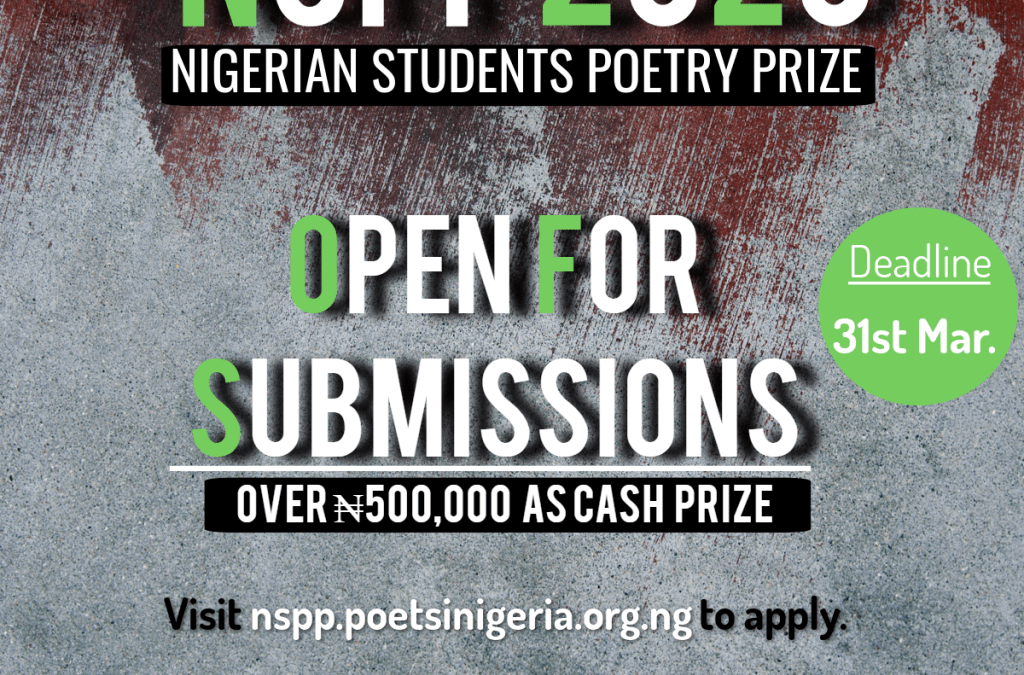About two weeks ago, Poets in Nigeria (PIN) opened submissions for the 2020 Nigerian Students Poetry Prize (NSPP). And the Prize is worth N500,000.00 this year! That’s some good money, and indeed a great reward for undergraduates who write poetry. If you are a Nigerian student who does poetry as a pastime or for whatever reason, this is one contest you need to enter your work!
Are you looking to enter NSPP 2020, then this piece is a “sit through it all” for you. Grab a seat, make yourself comfortable and let’s tell you how to write a poem that has a high chance of winning. The main intent of this is to make the entry process easier and guide you to write stronger lines.
First, you must know that a theme-less competition is not an easy one to win. If all entrants were to write on one theme and you take your time to examine every possible side of that theme with the lenses of deep thoughts, then you can pick the most hideous detail; expose it, expand it in a unique way and boom, you have won!
However, such is not the case with theme-less contests. Every entrant brings the juiciest fruit he or she can lay hands on in a large orchard. After a careful study of the judges’ score sheet for the Nigerian Students Poetry Prize 2019, I made this finding: the judges (of themeless contests) are presented with a huge bowl of fruit salad. Sliced pawpaw, pineapple, mango, banana, etc. So if there are 3 of the judges loving bananas, it is going to bounce up to the top, as the best fruit in the bowl.
FOr some time now, I have been thinking about tips on how a person can write the best entry in a contest of over a thousand entrants. Yeah, last year, there were a total of 905 entrants. And that means piles and piles of poems to be read by the judges. How do you write a poem that would make the judges sigh or smile or make their pupil dilate in some sort of poetic adoration?
Helpful tips for all NSPP, 2020 entrants
I’ll give you a few tips from my three-time experience of entering NSPP from 2017 to 2019; in which I went from not making top 100, to making top 100 in the second year and finally making the top three in the last edition. So, below are some helpful tips on how to increases your chances of winning the NSPP 2020.
1. Start thinking early: Thinking makes 50% of my writing process. It’s the way I turn my idea over and over in my mind. I look at it from various angles. I ask myself, “How do I shock the reader?” “Do I need some characters to bear my imageries and deliver them like a salesman at the door of their minds?” “Or can I trust my words to do it without using any names?” I always enter contests on the deadline. That’s very risky, you know. But I start thinking about what to send as soon as I see the call for submissions.
2. Read: Get the anthologies of top 100 poems of the previous years and read them. I read Mixed History and The Sun Will Rise Again in preparation for entering the 2019 edition of this prize. In 2017, the first year I entered, I simply copied one of my hazy lines from my Facebook page and sent it. 2018, I was more intentional. I wrote A Tale of Migratory Locusts & the Holocaust for weeks. In 2019, I thought, read and wrote. And the results show it. I do not mean to say that it’s always about the effort, but sometimes it can make all the difference. So get The Sun Will Rise Again (2016), Mixed History (2017), Deep Dreams (2018) and Micah (2019). Read the fine blend of creativity in those books.
3. Start writing early: I had close to three versions of the poem (An Artefact of a Groin War) I sent in for the 2019 edition of NSPP. I reviewed and re-wrote. Read them out loud to me. Said the lines again and again in my bathroom. Gave it to three of my close friends to read and share their honest opinion. Note that I said ‘honest opinion’ and don’t go to friends who would say ‘deep’ ‘mad o’ and all the other things in between. And okay, the friends I gave; one said ‘fair’. Another said ‘good’ but the verses are not linked. The last said, ‘great! but get such and such line out.’
4. Edit carefully. Don’t fall short with your use of punctuation marks, that is if you are using any at all. Misused punctuation marks can make your lines incoherent. Don’t overblow your work with heavy words. Stay simple. You are likely to fall and lose a tooth if you try to pick a fruit that’s so high up in the branches. If you get confused about the meaning of a word you are about to weave into your lines, consult a dictionary or look it up online.
5. Set aside some money and choose your own deadline: As part of the entry requirements, all entrants must purchase one of the four anthologies of the top 100 poems in the previous editions of the contest. In 2018, I realized that I had to do this a few minutes to the deadline. Imagine I had no money. Sometimes, students are just plain broke. But luckily, this wasn’t the case, it was the poor network that hooked me. I had a ready poem yet I nearly couldn’t pull through with submission. So if the money doesn’t stop you, don’t let internet connection stop you. Set your own deadline to two days or at least one day before the deadline. I understand that you don’t want to turn in your poem one month earlier then wake up to your muse dishing paper-pulsating lines after submission. In any case, start trying to submit, latest a day to the deadline.
Read the guidelines for the submission. Check your eligibility for the contest and apply here.
Note that, former contributing authors at EBOquills and present subscribers to our newsletters who are eligible will get a free edit of their entries from our team. Simply use our ‘contact us‘ form.
We wish you all the best!
Eboquills
Related posts
8 Comments
Leave a Reply Cancel reply
This site uses Akismet to reduce spam. Learn how your comment data is processed.






Thanks, Ebony?
Welcome, dear!
On point.
I should opt in.
You really should!
Thanks so much, this was helpful
You are welcome.
[…] announce its 11th Annual Meditation Poetry Contest. The total prize money is $450 and there is no entry fee required. We advise that entrants read the entries of previous winners. This will help […]
[…] to announce its 11th Annual Meditation Poetry Contest. The total prize money is $450 and there is no entry fee required. We advise that entrants read the entries of previous winners. This will help you acquaint […]